You are here
New Releases
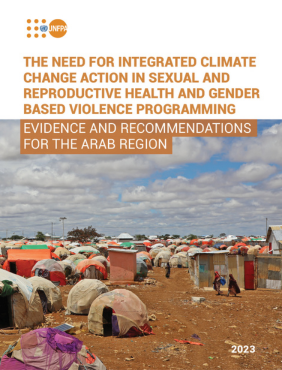
THE NEED FOR INTEGRATED CLIMATE CHANGE ACTION IN SEXUAL AND REPRODUCTIVE HEALTH AND GENDER BASED VIOLENCE PROGRAMMING - EVIDENCE AND RECOMMENDATIONS FOR THE ARAB REGION
Climate change is the greatest environmental challenge of our time and is a major threat to the vision of human-centred sustainable development as outlined in the International Conference on Population and Development (ICPD) Programme of Action. Climate change has also emerged as one of the most complex and important factors in the Arab region with dire impacts on water scarcity, food security and human health. The increasing frequency of natural disasters and extreme weather events is exacerbating the social, political, and economic challenges and is rendering the region even more vulnerable to instability and conflict.
The pace of climate change, expected to accelerate over the next decade, alongside gender inequalities, extremism, and acute and protracted crises may make it more challenging to achieve the 2030 Agenda for Sustainable Development including the ICDP Programme of Action in the Arab Region. In effect, climate change, gender equality, and sexual and reproductive health and rights (SRHR) are inextricably linked. SRHR has to be considered a key component of climate adaptation and resilience action and of climate justice.
UNFPA’s value proposition on climate change outlines a multi-pronged approach via four pillars to integrate SRHR into climate adaptation strategies, and thereby deliver for women and young people.
This paper presents a review of existing evidence based on the linkages between climate change and SRHR in the Arab Region and outlines UNFPA opportunities for engagement with counterparts in governments and other organisations. The paper formulates recommendations in support of strengthening resilience to climate change for women and girls across various levels of operation and programmatic areas. Women and girls can be effective change-makers for climate resilience as their participation and involvement in sustainability initiatives is leading to more effective climate action.
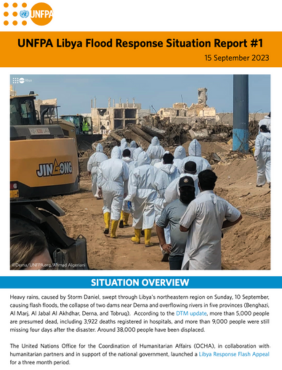
UNFPA Libya Flood Response Situation Report #1
Heavy rains, caused by Storm Daniel, swept through Libya's northeastern region on Sunday, 10 September, causing flash floods, the collapse of two dams near Derna and overflowing rivers in five provinces (Benghazi, Al Marj, Al Jabal Al Akhdhar, Derna, and Tobruq). According to the DTM update, more than 5,000 people are presumed dead, including 3,922 deaths registered in hospitals, and more than 9,000 people were still missing four days after the disaster. Around 38,000 people have been displaced.
The United Nations Office for the Coordination of Humanitarian Affairs (OCHA), in collaboration with1 humanitarian partners and in support of the national government, launched a Libya Response Flash Appeal for a three month period.
More than 880,000 people in the five hardest-hit provinces, including 440,000 women, were affected by the disaster with more than 40,000 displaced people. The cities of Derna, Battah, Soussa, Al Marj, Taknis, Al Bayda, Shahat, Al Bayadah, Tolmeita, Tokra, Al Abyar and Bersis are among the worst affected and schools and hotels are being used for shelter. Telecommunications and electricity outages combined with road collapses are making access to information extremely challenging.
Both the Foreign Affairs Committee of the Libyan House of Representatives and the Presidential Council have requested international assistance.
UNFPA estimates that up to 230,000 of the people in need of humanitarian assistance are women and girls of reproductive age (15 to 49 years) among whom an estimated 24,000 women are pregnant and in need of essential sexual and reproductive health (SRH) services, including basic and comprehensive emergency obstetric and neonatal care (B/CEmONC). Around 2,625 pregnant women among the people in need of humanitarian assistance are expected to give birth in the next month.
An increased number of women are exposed to risks of gender-based violence (GBV) and sexual exploitation and abuse (SEA) as women and girls are on the move, displaced in temporary shelters and deprived of basic needs. Gender-based violence was already a critical issue for women and girls in Libya prior to this crisis.
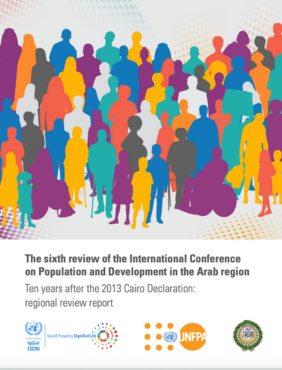
The sixth review of the International Conference on Population and Development in the Arab region - Ten years after the 2013 Cairo Declaration: regional review report
This report was jointly prepared by the United Nations Population Fund’s Arab States Regional Office (UNFPA-ASRO), the United Nations Economic and Social Commission for Western Asia (ESCWA), and the League of Arab States. The report is based on data and information drawn from a survey filled out by 13 Arab Governments assessing their progress and challenges using national data.
This Regional Review Report, is based on both quantitative and qualitative data provided by countries, finds that progress has been made in many areas. Some countries have enacted and are implementing new legislation to eliminate gender discrimination and to empower women and girls including through addressing negative social norms, investments in education, supporting their integration in the labour market, and a gender-responsive budgeting approach. There are good examples of investments in capacity-building and in strengthening of institutions, multisectoral coordination, accountability and participatory approaches. The responses provided by Arab Governments for this report recognize that complex issues must be addressed through cross-sectoral mechanisms. They underscore the need to allocate dedicated resources to meet the goals of the 2013 Cairo Declaration, to build capacities within ministries and departments, to make the best use of technology, and to build strong policy frameworks and implementatio mechanisms that will yield success. Similarly, countries also underline the importance to strengthen and expand systematic data collection mechanisms at national and local levels to ensure that their policies and measures comprehensively and effectively provide the complex picture presented by the Arab region across areas of the ICPD Programme of Action and the 2013 Cairo Declaration for the benefit of all their populations.
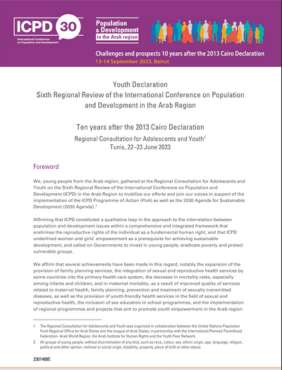
Youth Declaration - Sixth Regional Review of the International Conference on Population and Development in the Arab Region
We, young people from the Arab region, gathered at the Regional Consultation for Adolescents and Youth on the Sixth Regional Review of the International Conference on Population and Development (ICPD) in the Arab Region to mobilize our efforts and join our voices in support of the implementation of the ICPD Programme of Action (PoA) as well as the 2030 Agenda for Sustainable Development (2030 Agenda).
Affirming that ICPD constituted a qualitative leap in the approach to the interrelation between population and development issues within a comprehensive and integrated framework that enshrines the reproductive rights of the individual as a fundamental human right, and that ICPD underlined women and girls’ empowerment as a prerequisite for achieving sustainable development, and called on Governments to invest in young people, eradicate poverty and protect vulnerable groups.
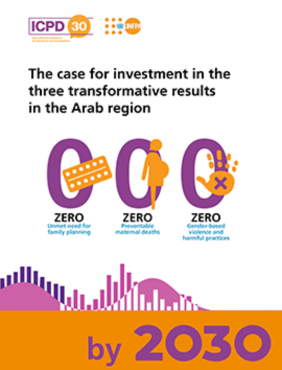
The case for investment in the three transformative results in the Arab region
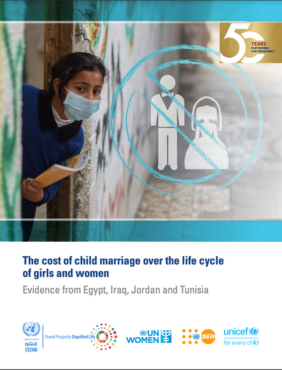
The cost of child marriage over the life cycle of girls and women: Evidence from Egypt, Iraq, Jordan and Tunisia
Child marriage violates human rights and is a significant impediment to achieving the 2030 Agenda for Sustainable Development. Although progress has been made in reducing child marriage worldwide, it remains prevalent (including in the Arab region), fuelled by sociocultural norms, poverty, lack of education, and external factors such as conflict or natural disasters. Research confirms that child marriage has severe and far-reaching consequences for women and girls, affecting all aspects of their lives, families and society. This new study estimates the costs of child marriage at different stages of women’s lives, using a life-cycle skill formation model in four Arab countries, namely, Egypt, Iraq, Jordan, and Tunisia. The study provides new insights into the multifaceted costs of child marriage and highlights the urgent need for action to eliminate this harmful practice.
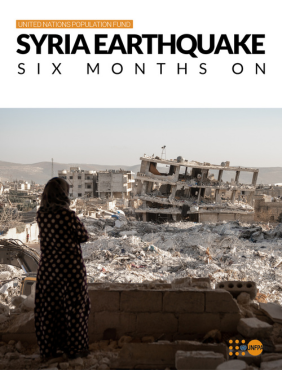
Syria Earthquake - Six Months On
Six months after the devastating earthquake that struck Syria in February, the humanitarian situation throughout the country remains volatile, with 2023 shaping up to be one of the worst years of a crisis that has now entered its thirteenth year.
Despite these challenges, UN agencies and partners have made progress in restoring service delivery points, including safe spaces and health clinics, to provide critical services such as GBV assistance and healthcare. Some referral hospitals damaged by the earthquake have resumed services, reducing pressure on temporary facilities.
This report provides an overview of UNFPA's main achievements during the first 180 days of the earthquake.
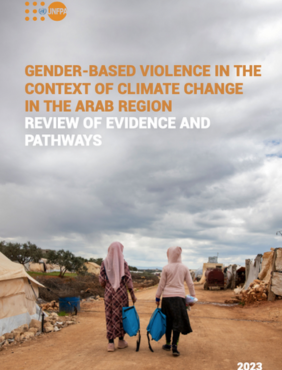
GENDER-BASED VIOLENCE IN THE CONTEXT OF CLIMATE CHANGE IN THE ARAB REGION 2023 REVIEW OF EVIDENCE AND PATHWAYS
This paper aims to present the evidence on the interlinkages between climate change and gender-based violence in the Arab region and to provide recommendations to support the international community, policy-makers, feminist and climate change advocates, researchers and professionals in the field of climate change and gender issues. A version of this study encompassing the wider membership scope of the Organisation of Islamic Cooperation beyond the Arab region will also be published in the Flagship report of the Women Development Organisation, titled “The Status of Gender Equality and Women’s Empowerment in OIC Member States 2021-2022: Women and Climate Change”.
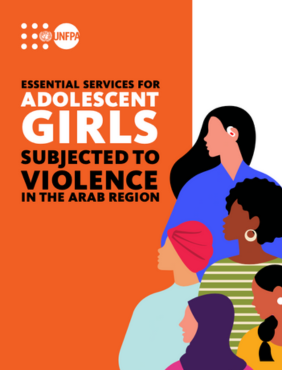
ESSENTIAL SERVICES FOR ADOLESCENT GIRLS SUBJECTED TO VIOLENCE IN THE ARAB REGION
Coordinated, age-responsive essential services are required for the prevention and response to GBV to mitigate the adverse impacts of violence on adolescent girls in a way that is specific to their realities. Following the guiding framework of the Essential Services Package, the current paper is an effort to provide an initial mapping into the availability and delivery of GBV essential services for adolescent girls and to provide recommendations to strengthen GBV prevention and response services for adolescent girls in the Arab region. The study is targeted at policy-makers, researchers, programmers, civil society and other professionals in the field of gender-based violence and in adolescent girls programming.
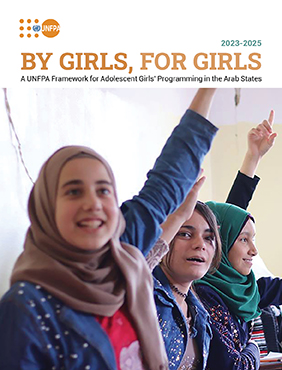
By girls, for girls - Framework for Adolescent Girls’ Programming in the Arab states 2023-2025
This Regional Adolescent Girls Framework for 2023-2025 intends to strengthen, better coordinate, and expand adolescent girl-centred initiatives and programmes in the Arab region.